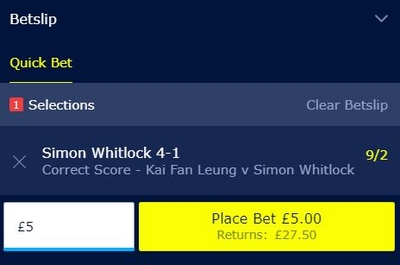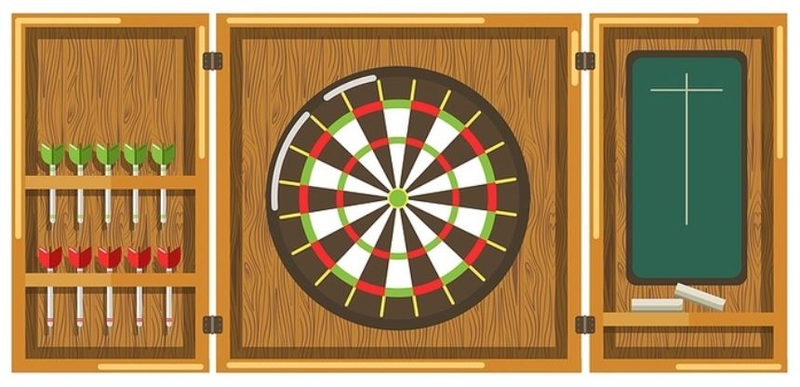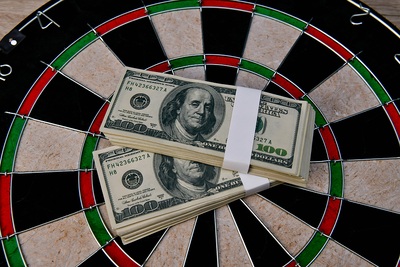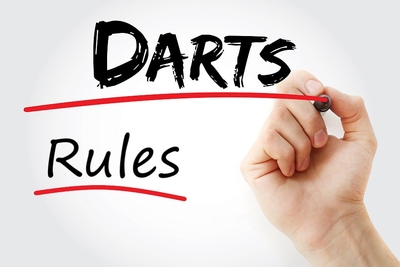 The most popular bets in darts are also the simplest, with many punters opting to stick to betting on a player to win an individual match or, alternatively, on them to win a tournament outright.
The most popular bets in darts are also the simplest, with many punters opting to stick to betting on a player to win an individual match or, alternatively, on them to win a tournament outright.
However, as with all sports, the best bookies around now offer a dizzyingly wide range of alternative markets and among the most popular of these is correct score betting.
If you aren’t sure what this is, how it works, or how to use it, read on for the details.
We are also going to cover some of the advantages and disadvantages of this bet and variations on the theme.
What Is Correct Score Betting In Darts?

The Correct Score (CS) market is a more specific bet than simply betting on who will win a given match. It is fairly self-explanatory really and like correct score bets in other sports, such as tennis or football, you are naming the exact score by which the victor will triumph in an individual match.
Depending on the event or tournament in question the format may vary. Many tournaments are played in a set format, including, for example, the sport’s biggest competition, the PDC World Darts Championship. Players win a leg by being first to score 501 (ending with a double or bullseye) and the first to three legs wins the set. In the early round games are best of five sets, increasing to best of 13 by the final.
In such tournaments, CS betting on a specific game will be based on the set score, so if we assume it is a lesser event and matches are best of just three sets (first to two), your options would be as follows:
- Player A wins 2-0
- Player A wins 2-1
- Player B wins 2-0
- Player B wins 2-1
Odds will be offered for every possible scoreline, meaning there will be many more options for games that are best of nine, 11, or 13 sets. In our example above, if we assume that Player A is a big favourite, priced at odds of 1/10 to win the match, then the correct score option of 2-0 to that favourite will be priced at quite short odds, with 2-1 priced at slightly longer odds. The longest priced option, at really big odds, will be 2-0 to Player B, the clear underdog. (We’ll look at typical odds for various scenarios later in the article.)
Other tournaments within the sport work on a legs format. In such events there are no sets and games are decided on legs alone. The number of legs required to win will typically be considerably higher, with best of seven or nine usually the starting point, going up to best of 31 or even more.
The concept of CS betting works in exactly the same way but you are simply betting on what the score in legs will be. Note that in some league and group format tournaments a draw may be possible with matches played over an even number of legs. One such tournament is darts’ Premier League, where the earlier rounds are played over 12 then 14 legs, facilitating draws of 6-6 and 7-7 respectively. The bookies’ CS market will have odds for all possible wins (for either player) as well as the draw.
Advantages And Disadvantages Of CS Darts Betting
 As with CS wagering in other sports, the obvious advantage is that it allows you to get bigger odds compared to the standard match odds market. With darts matches only featuring two selections, the odds are typically short. An even match will see both players priced at odds just under 1/1 (2.0 in decimal odds), aka evens, with the gap between the two players getting greater the more one sided a match is predicted to be.
As with CS wagering in other sports, the obvious advantage is that it allows you to get bigger odds compared to the standard match odds market. With darts matches only featuring two selections, the odds are typically short. An even match will see both players priced at odds just under 1/1 (2.0 in decimal odds), aka evens, with the gap between the two players getting greater the more one sided a match is predicted to be.
In a match with a very clear favourite you may see odds of 1/2 for one player and around 12/5 for the other. In such a scenario, unless you predict an upset then you may not want to have a bet because such short odds on the favourite do not offer much in the way of a return. In even bigger mismatches the better player can be significantly shorter too and so the correct score market gives punters a chance to obtain a bigger return by backing the favourite to win by a specific score.
Ultimately, whether you back the favourite or not, CS betting will give you bigger prices than the standard match odds because you are giving a more detailed, more specific prediction about how the match will play out. And therein lies the downside.
Self-evidently it is harder to predict the exact score than simply who will win a match. In darts, particularly in a legs-only format, it only takes a few very good darts or a few very bad darts for something unexpected and unpredictable to occur. So, whilst the odds are longer and the rewards potentially harder, landing winners is far from easy.
Indicative Odds
Naturally odds will vary from site to site and match to match but to give you an idea of what prices you might get, let us consider two games, one that is relatively even and another with a big favourite. The various correct score odds for a best of 11 game between players well matched and available at odds of 4/5 and evens respectively can be seen below.
| Result/Score | Player A Odds | Player B Odds |
|---|---|---|
| To win | 4/5 | Evens |
| 6-5 | 11/2 | 6/1 |
| 6-4 | 5/1 | 6/1 |
| 6-3 | 11/2 | 15/2 |
| 6-2 | 15/2 | 10/1 |
| 6-1 | 12/1 | 18/1 |
| 6-0 | 28/1 | 40/1 |
If we consider a match that is perceived to be more of a mismatch, we can see alternative odds below:
| Result/Score | Player A Odds | Player B Odds |
|---|---|---|
| To win | 3/10 | 5/2 |
| 6-5 | 11/2 | 17/2 |
| 6-4 | 9/2 | 10/1 |
| 6-3 | 4/1 | 14/1 |
| 6-2 | 9/2 | 20/1 |
| 6-1 | 6/1 | 33/1 |
| 6-0 | 14/1 | 80/1 |
As these tables show, the darts CS market can offer some really big odds if you are brave and bold enough. That is even more so the case if you go for one of the more unlikely scores, but even backing a narrow favourite to win in the deciding game increases the price from 4/5 to 11/2.
Other Correct Score Markets And Bets
Correct score betting as we have detailed it is one of the most common bets away from the match odds. However, there are a number of similar and related bets if you want to add even more variety or a little less specificity to your wager and you can see some of these below. Note that not all of these will be available on every match at every bookie, whilst some sites may have others not listed here.
- Correct score after… – such a bet requires you to predict the score after a specified number of sets or legs, with multiple lines – e.g. four legs, six legs, eight legs – available
- Total legs or sets – this is a less specific prediction about the total number of legs or sets that will be played in a match, the closer the match turns out to be, the greater the number of legs/sets will be played
- Either player to win… – a bet that covers either player to win by a named score, usually 6-5 (in a best of 11 game)
Rules To Be Aware Of
 This is a fairly straightforward market and there isn’t too much to look out for. As with most rules and markets you should always check with your specific bookie as there may be some minor variations. Otherwise, if you have any doubts about the way a bet has settled, contact customer service for help.
This is a fairly straightforward market and there isn’t too much to look out for. As with most rules and markets you should always check with your specific bookie as there may be some minor variations. Otherwise, if you have any doubts about the way a bet has settled, contact customer service for help.
That said, in general the only thing to note is that most sites will void a bet if a match is not completed. In the event of injury, illness or anything else, bets will be made void.
This is also usually the case if a match is postponed or cancelled, or one of the players is substituted. Unfortunately some sites may settle bets as losers, rather than void bets, if they are unconditionally settled (for example you back a player to win 6-0 and the game is halted at 2-2).
